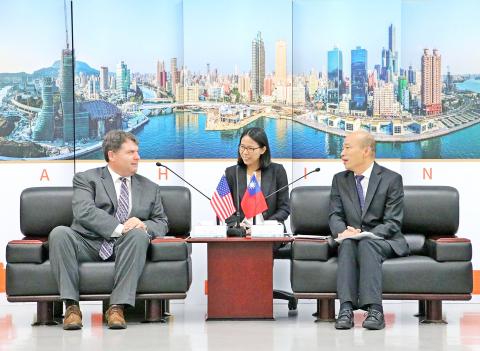Kaohsiung Mayor Han Kuo-yu (韓國瑜) yesterday said that if elected president, he would promote foreign policy aimed at bringing substantial improvements to the nation’s economy, instead of policy aimed at “saving face.”
During his weekly Facebook livestream, the Chinese Nationalist Party (KMT) presidential candidate criticized President Tsai Ing-wen (蔡英文) for her “shockingly strong” attitude on diplomatic issues, which he said has yielded laughable results.
Over the past three years, the Tsai administration has lost five diplomatic allies, and rumors suggest that the Solomon Islands could be next, he said.

Photo copied by Ko Yu-hao, Taipei Times
Meanwhile, seven of the nation’s representative offices abroad have been renamed or downgraded, he said.
Tsai’s foreign policy has led the nation on an “increasingly narrow and dangerous path,” he said.
“Currently, what is more important for Taiwan? Saving face or making substantial improvements?” he asked.
As president, he would promote foreign policy that focuses on trade and brings substantial improvements to the nation, he said.
His foreign policy would consist of three aspects: protecting local businesses, offering international medical assistance and providing a platform for young people, he said.
One of the ways Han would help Taiwanese companies would be to assign diplomats stationed abroad the additional role of being a promoter for Taiwan’s businesses and products, said Dale Jieh (介文汲), Han’s policy adviser and a former diplomat.
There are more than 100 Taiwanese diplomats stationed abroad with the experience, knowledge and connections to promote Taiwan’s products, he said, adding that the government only needs to provide them with more resources and objectives.
In addition to promoting Taiwan’s products, the diplomats could also help bring investors and technologies to Taiwan, Jieh said.
Han would also promote plans to offer assistance to other nations to improve their healthcare infrastructure, he said, adding that Taiwan has a leading healthcare industry.
As president, Han would also provide more support to international volunteer programs and international competitions for young people, Han’s campaign office said.
Han’s diplomatic strategy is in line with the mainstream approach in diplomacy worldwide, Jieh said.
“Foreign policy must be practical and realistic, rather than ideological,” he said.
Democratic Progressive Party (DPP) officials responded to criticism of the government’s foreign affairs policies after Han’s office said that the “abnormal cross-strait relations” since the DPP assumed power in 2016 were to blame for the arrest of Taiwanese by Chinese authorities.
DPP spokeswoman Hsueh Cheng-yi (薛呈懿) said that cross-strait relations with China “can only be built upon a foundation of democratic values, freedom, due process of law and human rights, to able to protect the lives of Taiwan’s citizens.”
“Han always blames the DPP for problems ... in dealing with China. This only highlights Han’s shallow understanding and his own abnormal concepts about the very complicated issues surrounding cross-strait relations,” Hsueh said.
From 2008 to 2016 when the KMT was in power, more than 600 Taiwanese were arrested by the Chinese government, he said.
According to Han’s logic, it could be said that former president Ma Ying-jeou’s (馬英九) tenure was also a period of abnormal cross-strait relations, Hsueh said.
“Starting in May 2016, Beijing used political issues as reasons to cut off meaningful dialogue and communication with Taiwan, and ravaged existing cross-strait agreements,” Hsueh said. “It is China who ignored and damaged the rights of the people on both sides of the Taiwan Strait.”
“Instead of pointing to China as an unprincipled, untrustworthy regime, which undermined agreements, and arrest our citizens arbitrarily, Han turns the blame on our government, which is incomprehensible to us,” Hsueh said.

US climber Alex Honnold is to attempt to scale Taipei 101 without a rope and harness in a live Netflix special on Jan. 24, the streaming platform announced on Wednesday. Accounting for the time difference, the two-hour broadcast of Honnold’s climb, called Skyscraper Live, is to air on Jan. 23 in the US, Netflix said in a statement. Honnold, 40, was the first person ever to free solo climb the 900m El Capitan rock formation in Yosemite National Park — a feat that was recorded and later made into the 2018 documentary film Free Solo. Netflix previewed Skyscraper Live in October, after videos

Starting on Jan. 1, YouBike riders must have insurance to use the service, and a six-month trial of NT$5 coupons under certain conditions would be implemented to balance bike shortages, a joint statement from transportation departments across Taipei, New Taipei City and Taoyuan announced yesterday. The rental bike system operator said that coupons would be offered to riders to rent bikes from full stations, for riders who take out an electric-assisted bike from a full station, and for riders who return a bike to an empty station. All riders with YouBike accounts are automatically eligible for the program, and each membership account

A classified Pentagon-produced, multiyear assessment — the Overmatch brief — highlighted unreported Chinese capabilities to destroy US military assets and identified US supply chain choke points, painting a disturbing picture of waning US military might, a New York Times editorial published on Monday said. US Secretary of Defense Pete Hegseth’s comments in November last year that “we lose every time” in Pentagon-conducted war games pitting the US against China further highlighted the uncertainty about the US’ capability to intervene in the event of a Chinese invasion of Taiwan. “It shows the Pentagon’s overreliance on expensive, vulnerable weapons as adversaries field cheap, technologically

Temperatures are forecast to drop steadily as a continental cold air mass moves across Taiwan, with some areas also likely to see heavy rainfall, the Central Weather Administration (CWA) said. From today through early tomorrow, a cold air mass would keep temperatures low across central and northern Taiwan, and the eastern half of Taiwan proper, with isolated brief showers forecast along Keelung’s north coast, Taipei and New Taipei City’s mountainous areas and eastern Taiwan, it said. Lows of 11°C to 15°C are forecast in central and northern Taiwan, Yilan County, and the outlying Kinmen and Lienchiang (Matsu) counties, and 14°C to 17°C